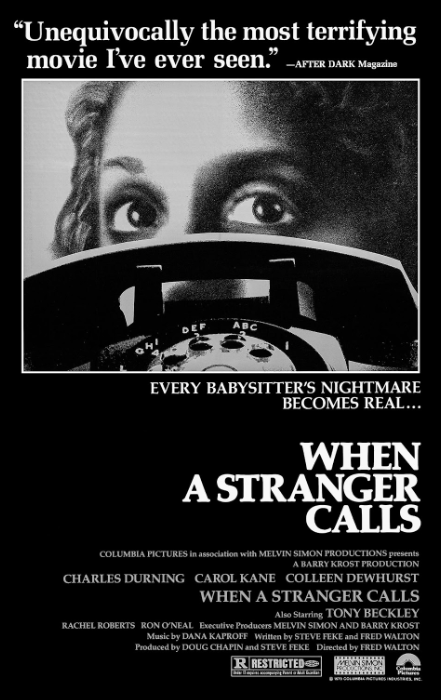“When A Stranger Calls,” directed by Fred Walton and released in 1979, has very bad reviews, including a 49 percent audience score on Rotten Tomatoes. One cinephile wrote, “This one wasn’t really a slasher; it was more of a… I don’t really know what it is. It isn’t a horror film and it isn’t a slasher film, it isn’t anything that it says it is.” They ended their review with, “So, my overall advice is this: watch the first 23 minutes and shut this off and pretend that there isn’t anything else to the movie. If you do that it will become a favorite horror film of yours. If you don’t like to leave things unfinished, well, you’re in for a pretty crappy film.” If those bad reviews aren’t enough, the critics of Rotten Tomatoes awarded the movie a 38 percent score; most of the reviews simply call it boring. Keith Breese from Film Critic goes further, saying, “I dare you to try sitting through the middle 70 minutes.” Well, I sat through the middle 70 minutes (as well as the rest of the movie) twice and I enjoyed myself thoroughly.
“When A Stranger Calls” is a tense horror movie that remains completely unpredictable the whole time. Carol Kane plays her part of the potential victim perfectly. Her scared looks and loud screams add so much to the already gothic nature of the movie. Curt Duncan acts as an insane person desperately trying to be sane, which makes him all the more sympathetic yet also all the more terrifying. Charles Dunning plays the police officer dealing with his own moral dilemmas. Finally, Colleen Dewhurst, known for her powerful stage interpretation of Eugene O’Neill’s works, plays a smaller part that deserves equal recognition only because of the talent she brings to the role.
The movie is Fred Walton’s feature film debut. It was co-written by Steve Frakes. Unfortunately, neither ever achieved high amounts of success in the film industry; this is so sad because both the writing and directing of When A Stranger Calls are so good. It’s a thrilling film that frightens and excites but throughout the entire movie, very little blood is drawn. The directing contributes to this atmosphere by being meticulous and well thought out. Pause the movie at any point and you’ll have something that looks like a painting.
The movie’s script is clever because it constantly builds off implications. What if he did that? What if she does that? Many times, it feels scarier than if it was absurdly gory because the potential for something to happen has more possibilities than the thing actually happening. Perhaps, the greatest part of the writing is that nobody is actually a “stranger.” Without detracting from its horror, the movie spends a long amount of time allowing the audience to get to know all of the characters. By the end of the movie, each one feels friend-like, even the villain of the story. Without spoiling too much, I also want to note that part of the genius of the story is that it loops. It doesn’t follow a conventional plot structure. Clearly, this made some viewers particularly upset, but, for me, it just added to the beauty and complexity of the story.
I watched this movie for the first time in 2020 and four years later, I decided to watch it again because, for me at least, it was a particularly hard movie to remember. It keeps the surprises so under its sleeve that I had trouble remembering how a lot of the twists and turns occurred in the first place. I am saying all of this in the most positive way possible. However, clearly, for others, this could be part of the reason why they didn’t enjoy the movie. They may wish for movies to only build and satisfy. However, sometimes, the most logical way to make something isn’t the best one.
Maybe I am being completely arrogant to think that just because I liked the movie it should be received well. However, in this case, I truly believe that sometimes the reception of a movie just matters in terms of who gets there first. Whether a movie gets lots of hate or becomes a cult classic may simply depend on many other outside factors. It’s the only reason I can think of to explain these reviews away. I won’t accept anyone saying the movie is boring because it really isn’t. It’s not even close. It’s a movie with lots of murder and suspense and it is impressively well-made.
I want to end this review by saying that Keith clearly can’t be trusted but then so can’t Gary Arnold from the Washington Post or Nick Schager from Lessons of Darkness or Charles Cassady from Common Sense Media and so on and so on and I guess all of that is true. A recent problem for me has been how much my taste differed from Rotten Tomatoes critics. I also recently watched and loved “Heartburn” (1986), “What Lies Beneath” (2000), “Snake Eyes” (1998), “Consenting Adults” (1992) and “Birth” (2004) all of which had Rotten Tomato scores below fifty percent. I’ve learned to never trust Rotten Tomatoes and critics in general and I think you should do the same.
If “When A Stranger Calls” seems like it could be your thing, watch it. If it doesn’t, don’t. Whatever you do though, don’t trust the Rotten Tomatoes reviews more than me because at the end of the day, all it is is somebody who isn’t you.






